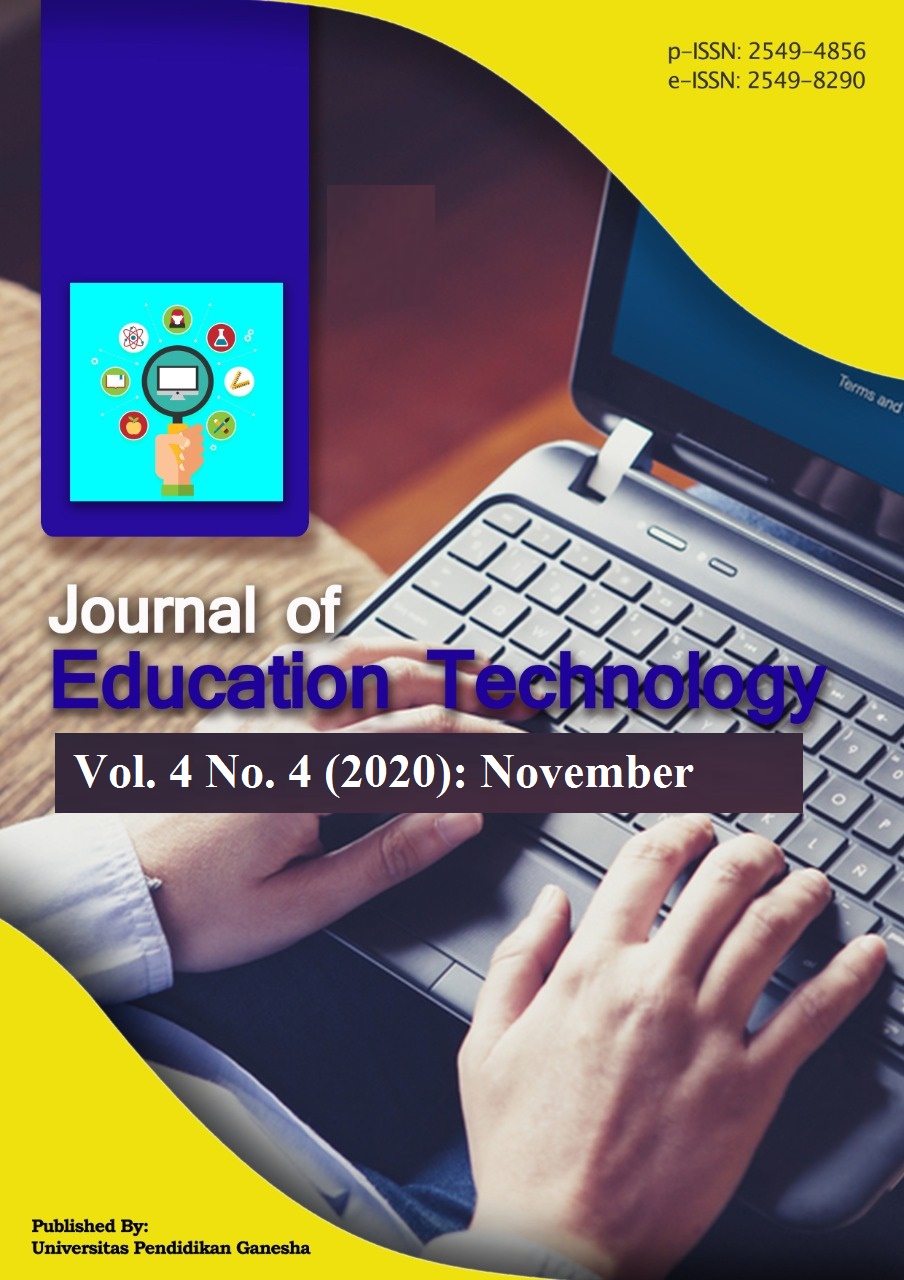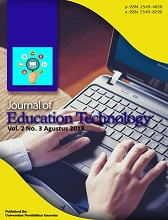Reciprocal Teaching-Learning Model Assisted with Flash Card Improve Student Science Competence
DOI:
https://doi.org/10.23887/jet.v4i4.27102Keywords:
reciprocal teaching, flash cardAbstract
The problem that is the basis of this research is that students tend to be passive and students are more likely to talk to their peers, so the purpose of this study is to determine the effect of the reciprocal teaching model assisted by flash card media on the competence of science knowledge in fourth grade students. The type of this research is quasi-experimental using a non-equivalent control group design. The population contained in this study was 266 students. Samples were taken using a random cluster technique which then obtained an experimental class of 36 people and a control class of 31 people. Data collection for science knowledge competencies using 40 validated objective test instruments. The data obtained were then analyzed using the polled variance t-test. Based on data analysis, it was obtained tcount = 5,250> t table = 2,000 at a significance level of 5% with dk = 65, so, H0 was rejected and Ha was accepted. So it can be concluded that there is a significant influence on the reciprocal teaching model of learning assisted by flash card media on the science knowledge competence of fourth grade students. The implication of this research in general is that this model can be used as an alternative for teachers in learning activities in order to increase the competency of students' science knowledge
References
A., Putrini Mahadewi, L. P., & Ngurah Japa, I. G. (2019). Pengaruh Model Pembelajaran Team Games Tournament (Tgt) Bermediakan Questions Box Terhadap Hasil Belajar Ipa. Mimbar Ilmu, 24(1), 73–82. https://doi.org/10.23887/mi.v24i1.17453
Agustino, I Kadek, dkk. 2017. “Pengaruh Model Pembelajaran Inkuiri Berbasis Penilaian Kinerja Terhadap Kompetensi Pengetahuan IPA Siswa Kelas IV Gugus IX Abiansemal Kecamatan Abiansemal Tahun Pelajaran 2016/2017”. Jurnal Mimbar PGSD Universitas Pendidikan Ganesha, Volume 5, Nomor 3 (hlm. 1-9).
Akhir, M. (2017). Penerapan Strategi Belajar Reciprocal Teaching terhadap Kemampuan Membaca pada Siswa SD. Indonesian Journal of Primary Education, 1(2), 30. https://doi.org/10.17509/ijpe.v1i2.9313
Andriyani, F., & Kusmariyatni, N. N. (2019). Pengaruh Media Komik Berwarna terhadap Hasil Belajar IPA Siswa. Jurnal Pedagogi Dan Pembelajaran, 2(3), 341. https://doi.org/10.23887/jp2.v2i3.19282
Anggreni, L. D., Jampel, I. N., & Diputra, K. S. (2020). Pengaruh Model Project Based Learning Berbantuan Penilaian Portofolio Terhadap Literasi Sains. 25(1), 41–52.
Anjelina Putri, A. A., Swatra, I. W., & Tegeh, I. M. (2018). Pengaruh Model Pembelajaran Pbl Berbantuan Media Gambar Terhadap Hasil Belajar Ipa Siswa Kelas Iii Sd. Mimbar Ilmu, 23(1). https://doi.org/10.23887/mi.v23i1.16407
Arikunto, Suharsimi. 2015. Dasar-dasar Evaluasi Pendidikan. Jakarta: Bumi Aksara.
Arsyad, Azhar. 2017. Media Pembelajaran. Jakarta: PT Raja Grafindo Persada.
Astriani, L. (2017). Pengaruh pembelajaran reciprocal teaching terhadap kemampuan pemahaman konsep matematika ditinjau dari kemampuan awal matematika siswa. FIBONACCI Pendidikan Matematika Dan Matematika. https://doi.org/https://doi.org/10.24853/fbc.3.1.77-85
Ayu, I. G., W, I. W., Kt, D. B., & Sem, N. (2020). Pengaruh Model Pembelajaran ( SAVI ) Berbasis ( TIK ) Terhadap Kompetensi Pengetahuan Matematika. 3(1), 15–24.
Chotima, M. C., Hartono, Y., & Kesumawati, N. (2019). Pengaruh reciprocal teaching terhadap kemampuan pemecahan masalah matematis ditinjau dari self-efficacy siswa. Pythagoras: Jurnal Pendidikan Matematika. https://doi.org/10.21831/pg.v14i1.22375
Dewi, N. P. S. (2018). Pengaruh Model Pembelajaran Learning Cycle 5e Berbantuan Media Lingkungan Terhadap Kompetensi Pengetahuan Ipa. Jurnal Penelitian Dan Pengembangan Pendidikan, 2(2), 113. https://doi.org/10.23887/jppp.v2i2.15389
Diah Purwati, N. L. P., Wibawa, I. M. C., & Margunayasa, I. G. (2019). Pengaruh Numbered Head Together Berbantuan Gambar Terhadap Penguasaan Kompetensi Pengetahuan IPA. Jurnal Pedagogi Dan Pembelajaran, 2(3), 282. https://doi.org/10.23887/jp2.v2i3.19275
Diantari, K. A., Suniasih, N. W., & Ardana, I. K. (2017). Pengaruh Model Pembelajaran Time Token Berbantuan Media Question Card Terhadap Kompetensi Pengetahuan Ipa Kelas Iv Sdn Gugus Dewi Sartika Kecamatan Denpasar Selatan. Journal of Education Technology, 1(3), 198. https://doi.org/10.23887/jet.v1i3.12505
Febbriana, I. R. A., Ardana, I. K., & Agustika, G. N. S. (2019). Pengaruh Model Pembelajaran Word Square Berbasis Outdoor Study Terhadap Kompetensi Pengetahuan IPA Siswa. MIMBAR PGSD Undiksha, 7(2), 149–156.
Febriani, N. P. P., Oka Negara, I. G. A., & Wiyasa, I. K. N. (2019). Pengaruh Model Pembelajaran Concept Sentence Berbantuan Flash Card Terhadap Kompetensi Pengetahuan Ipa. Journal for Lesson and Learning Studies, 2(3), 329–337. https://doi.org/10.23887/jlls.v2i3.19507
Hery, I. G., Putra, S., Gading, K., & Renda, N. T. (2018). Pengaruh Model Picture and Picture Dengan Penilaian Portofolio Terhadap Hasil Belajar IPA Kelas IV. 20, 85–94.
Junaidi, J., Ariani, T., & Arini, W. (2019). Pengaruh Model Pembelajaran Word Square terhadap Hasil Belajar Fisika. Science and Physics Education Journal (SPEJ), 2(2), 72–81. https://doi.org/10.31539/spej.v2i2.726
Karwati, N. P. R., Wiyasa, K. N., & Ardana, I. K. (2018). Pengaruh Model Pembelajaran Probing Prompting Berbantuan Multimedia Terhadap Hasil Belajar Ipa Siswa Kelas V Sd. Mimbar Ilmu, 23(2), 149–157. https://doi.org/10.23887/mi.v23i2.16421
Lestari, K. P., Kt, D. B., Semara, N., Agung, I. G., & Negara, O. (2018). Pengaruh Model Tipe Numbered Head Together Berbantuan Media Audio Visual terhadap Penguasaan Kompetensi Pengetahuan IPA Siswa Kelas IV SD Gugus Yos Sudarso . 2(1), 40–45.
Okta, P. D., Yennita, Y., & Ansori, I. (2018). Penerapan Model Pembelajaran Berbasis Masalah Untuk Meningkatkan Hasil Belajar Ipa. Diklabio: Jurnal Pendidikan Dan Pembelajaran Biologi, 2(1), 86–95. https://doi.org/10.33369/diklabio.2.1.86-95
Rivaldi, K. H. O., Putra, D. K. N. S., & Putra, I. K. A. (2018). Pengaruh Model Pembelajaran Problem Based Learning Berbantuan Audio Visual Terhadap Penguasaan Kompetensi Pengetahuan IPA. Jurnal Ilmiah Sekolah Dasar, 2(2), 128. https://doi.org/10.23887/jisd.v2i2.15494
Sanistiawati, N. M., Parwati, N. N., & Pasek Suryawan, I. P. (2019). Pengaruh Model Pembelajaran Reciprocal Teaching Terhadap Pemahaman Konsep Matematika Siswa Kelas Viii Smp Negeri 4 Amlapura. Jurnal Pendidikan Matematika Undiksha, 9(2), 65. https://doi.org/10.23887/jjpm.v9i2.19897
Sari, Y. I., & Suniasih, N. W. (2019). PENGARUH MODEL RECIPROCAL TEACHING TERHADAP KETERAMPILAN MENULIS BAHASA INDONESIA. 3, 58–64.
Sebesar 3,322, Sedangkan T. (2017). 1–11.
Sugiantiningsih, I. A., & Antara, P. A. (2019). Penerapan Model Pembelajaran Talking Stick Berbantuan Media Flash Card Untuk Meningkatkan Kemampuan Berbicara. Jurnal Ilmiah Pendidikan Profesi Guru, 2(3), 298–308. https://doi.org/10.23887/jippg.v2i3.15728
Triyana, A., Rara, Y., Agung, I. G., & Negara, O. (2020). Pengaruh Model Pembelajaran ( SAVI ) Berbantuan Multimedia Terhadap Kompetensi Pengetahuan IPA. 8, 40–49.
Warsiki, N. M. (2018). Penerapan Metode Pembelajaran Discovery Meningkatkan Prestasi Belajar Ipa. Jurnal Imiah Pendidikan Dan Pembelajaran, 2(3), 287. https://doi.org/10.23887/jipp.v2i3.16226
Wati, Ega Rima. 2016. Ragam Media Pembelajaran. Kata Pena.
Yanti, N. L. M. S. M. (2017). Pengaruh Model Pembelajaran Creative Problem Solving Berbasis Educative Games Terhadap Kemampuan Berpikir Kritis dan Hasil Belajar Ipa Kelas IV Di Gugus IV Kecamatan Kuta, Kabupaten Badung. Jurnal Ilmiah Pendidikan Dan Pembelajaran, 1(2), 90–99. https://doi.org/10.23887/JIPP.V1I2.11967
Downloads
Published
How to Cite
Issue
Section
License
Authors who publish with the Journal of Education Technology agree to the following terms:
- Authors retain copyright and grant the journal the right of first publication with the work simultaneously licensed under a Creative Commons Attribution License (CC BY-SA 4.0) that allows others to share the work with an acknowledgment of the work's authorship and initial publication in this journal.
- Authors are able to enter into separate, additional contractual arrangements for the non-exclusive distribution of the journal's published version of the work (e.g., post it to an institutional repository or publish it in a book), with an acknowledgment of its initial publication in this journal.
- Authors are permitted and encouraged to post their work online (e.g., in institutional repositories or on their website) prior to and during the submission process, as it can lead to productive exchanges, as well as earlier and greater citation of published work. (See The Effect of Open Access)


















